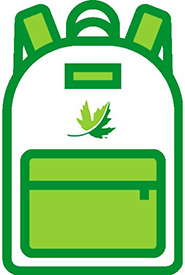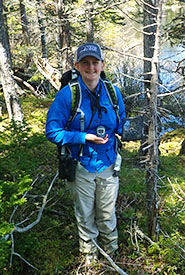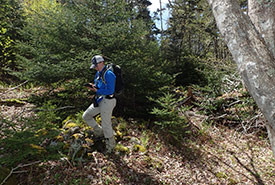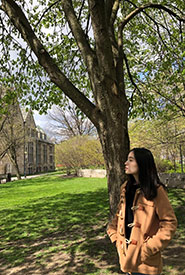Backpack Essentials: Head outdoors like a field scientist

Backpack Essentials (Image by NCC)
This blog post is part of the Backpack Essentials series, a series that explores the items that NCC staff carry with them when heading outside. It is inspired by the quarterly Nature Conservancy of Canada Magazine and our Nature Destinations program. To learn more about NCC’s properties across Canada, please visit naturedestinations.ca.
While most people prefer to turn off their cell phones and tablets when in nature, at the Nature Conservancy of Canada (NCC), technology is intertwined with the conservation work we do in the field.
Rebecca Sharp is a conservation intern for NCC’s Nova Scotia Region. She spends most of her days outside on our properties and considers technology to be essential in her field work.
“Data is critical to the science of conservation,” says Rebecca. In assessing species present in a habitat, scientists, in the olden days, would need to bring a map, compass and weather-proof notebook. Some modern conservationists in the field consider smartphones and tablets to be a blessing, as it combines everything into a hand-held device.

Rebecca uses a lot of tools in her conservation work. (Photo by NCC)
“I can’t go anywhere without my iPad,” she says. “Not only does it have a GPS that can track my whereabouts in the wilderness, but it also has apps that help me with data collection.”
Apps like Bad Elf and Collector can help improve your smartphone’s GPS and GIS systems, respectively. These innovative apps allow you to log your trips, and they can provide in-depth details of your speed, altitude and distance from your starting point. What makes them even more travel-friendly is that they do not depend on WiFi to gather data.
Rebecca has always been passionate about nature and the wildlife that lives within its complex ecosystems. She took a road less travelled by going to a non-traditional, boot-camp style college in the United States. The educational experience at Alderleaf Wilderness College allowed her to have field experience throughout her schooling.

Rebecca working in the field. (Photo by NCC)
“A conservation internship at NCC just felt like the next step,” she says.
Rebecca hopes for a future where conservation can keep up with the fast-developing tech world. Although the tools on her iPad are useful now, she would like to see innovation to increase the efficiency of data collection even more.
“I would love to use a drone,” she says. “In less time than it would take to walk, we can cover more habitats and identify even more species.”
The Conservation Internship Program is funded in part by the Government of Canada's Summer Work Experience program.


